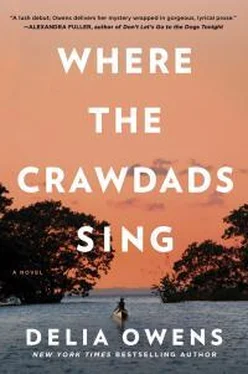“What’s this?” she asked. “Looks like sump’m even dogs wouldn’t drag in.”
“It’s that girl again. Miss Kya brung ’em. Sometimes she ain’t the first one with mussels, so she’s gone to smokin’ fish. Wants me to sell ’em.”
“Lawd, we gotta do something ’bout that child. Ain’t nobody gonna buy them fish; I can cook ’em up in stew. Our church can come up wif some clothes, other things for her. We’ll tell ’er there’s some family that’ll trade jumpers for carpies. What size is she?”
“Ya askin’ me? Skinny. All’s I know is she’s skinny as a tick on a flagpole. I ’spect she’ll be there first thing in the mornin’. She’s plumb broke.”
• • •
AFTER EATING A BREAKFAST of warmed-up mussels-in-grits, Kya motored over to Jumpin’s to see if any money’d come in from the smoked fish. In all these years it had just been him there or customers, but as she approached slowly she saw a large black woman sweeping the wharf like it was a kitchen floor. Jumpin’ was sitting in his chair, leaning back against the store wall doing figures in his ledger. Seeing her, he jumped up, waved.
“G’mornin’,” she called quietly, drifting expertly up to the dock.
“Hiya, Miss Kya. Got somebody here for ya to meet. This here’s ma wife, Mabel.” Mabel walked up and stood next to Jumpin’, so that when Kya stepped onto the wharf, they were close.
Mabel reached out and took Kya’s hand, held it gently in hers, and said, “It’s mighty fine to meet ya, Miss Kya. Jumpin’s told me what a fine girl ya are. One a’ de best oryster pickers.”
In spite of hoeing her garden, cooking half of every day, and scrubbing and mending for whites, Mabel’s hand was supple. Kya kept her fingers in that velvet glove but didn’t know what to say, so stood quiet.
“Now, Miss Kya, we got a family who’ll trade clothes and other stuff ya need for yo’ smoked fish.”
Kya nodded. Smiled at her feet. Then asked, “What about gas for ma boat?”
Mabel turned question eyes at Jumpin’.
“Well now,” he said, “I’ll give ya some today ’cause I know you’re short. But ya keep bringin’ in mussels and such when ya can.”
Mabel said in her big voice, “Lawd, child, let’s don’t worry none about the details. Now let me look atcha. I gotta calculate yo’ size to tell ’em.” She led her into the tiny shop. “Let’s sit right here, and ya tell me what clothes and what-all else ya need.”
After they discussed the list, Mabel traced Kya’s feet on a piece of brown paper bag, then said, “Well, come back tomorrer and there’ll be a stack here for ya.”
“I’m much obliged, Mabel.” Then, her voice low, said, “There’s something else. I found these old packages of seeds, but I don’t know about gardenin’.”
“Well now.” Mabel leaned back and laughed deep in her generous bosom. “I can sure do a garden.” She went over every step in great detail, then reached into some cans on the shelf and brought out squash, tomato, and pumpkin seeds. She folded each kind into some paper and drew a picture of the vegetable on the outside. Kya didn’t know if Mabel did this because she couldn’t write or because she knew Kya couldn’t read, but it worked fine for both of them.
She thanked them as she stepped into her boat.
“I’m glad to help ya, Miss Kya. Now come back tomorrer for yo’ things,” Mabel said.
That very afternoon, Kya started hoeing the rows where Ma’s garden used to be. The hoe made clunking sounds as it moved down the rows, releasing earthy smells and uprooting pinkish worms. Then a different clink sounded, and Kya bent to uncover one of Ma’s old metal-and-plastic barrettes. She swiped it gently against her overalls until all the grit fell clear. As if reflected in the cheap artifact, Ma’s red mouth and dark eyes were clearer than they’d been in years. Kya looked around; surely Ma was walking up the lane even now, come to help turn this earth. Finally home. Such stillness was rare; even the crows were quiet, and she could hear her own breathing.
Sweeping up bunches of her hair, she pinned the barrette above her left ear. Maybe Ma was never coming home. Maybe some dreams should just fade away. She lifted the hoe and clobbered a chunk of hard clay into smithereens.
• • •
WHEN KYA MOTORED up to Jumpin’s wharf the next morning, he was alone. Perhaps the large form of his wife and her fine ideas had been an illusion. But there, sitting on the wharf, were two boxes of goods that Jumpin’ was pointing to, a wide grin on his face.
“G’mornin’, Miss Kya. This here’s for ya.”
Kya jumped onto the wharf and stared at the overflowing crates.
“Go on, then,” Jumpin’ said. “It’s all your’n.”
Gently she pulled out overalls, jeans, and real blouses, not just T-shirts. A pair of navy blue lace-up Keds and some Buster Brown two-tone saddle shoes, polished brown and white so many times they glowed. Kya held up a white blouse with a lace collar and a blue satin bow at the neck. Her mouth opened a little bit.
The other box had matches, grits, a tub of oleo, dried beans, and a whole quart of homemade lard. On top, wrapped in newspaper, were fresh turnips and greens, rutabagas, and okra.
“Jumpin’,” she said softly, “this is more than those fish woulda cost. This could be a month’s fish.”
“Well now, what’a folks gonna do with old clothes layin’ ’round the house? If they got these things extra, and ya need ’em, and ya got fish, and they need fish, then that’s the deal. Ya gotta take ’em now, ’cause I ain’t got room for that junk ’round here.”
Kya knew that was true. Jumpin’ had no extra space, so she’d be doing him a favor to take them off his wharf.
“I’ll take ’em, then. But you tell ’em thank you, will you? And I’ll smoke more fish and bring it in soon as I can.”
“Okay then, Miss Kya. That’ll be fine. Ya bring in fish when ya git ’em.”
Kya chugged back into the sea. Once she rounded the peninsula, out of sight of Jumpin’s, she idled down, dug in the box, and pulled out the blouse with the lace collar. She put it on right over her scratchy bib overalls with patched knees, and tied the little satin ribbon into a bow at her neck. Then, one hand on the tiller, the other on lace, she glided across ocean and estuaries toward home.
13. Feathers
1960
Lanky yet brawny for fourteen, Kya stood on an afternoon beach, flinging crumbs to gulls. Still couldn’t count them; still couldn’t read. No longer did she daydream of winging with eagles; perhaps when you have to paw your supper from mud, imagination flattens to that of adulthood. Ma’s sundress fit snugly across her breasts and fell just below her knees; she reckoned she had caught up, and then some. She walked back to the shack, got a pole and line, and went straight to fishing from a thicket on the far side of her lagoon.
Just as she cast, a stick snapped behind her. She jerked her head around, searching. A footfall in brush. Not a bear, whose large paws squished in debris, but a solid clunk in the brambles. Then the crows cawed. Crows can’t keep secrets any better than mud; once they see something curious in the forest they have to tell everybody. Those who listen are rewarded: either warned of predators or alerted to food. Kya knew something was up.
She pulled in the line, wrapped it around the pole even as she pushed silently through the brush with her shoulders. Stopped again, listened. A dark clearing—one of her favorite places—spread cavernlike under five oaks so dense only hazy streams of sunlight filtered through the canopy, striking lush patches of trillium and white violets. Her eyes scanned the clearing but saw no one.
Читать дальше











